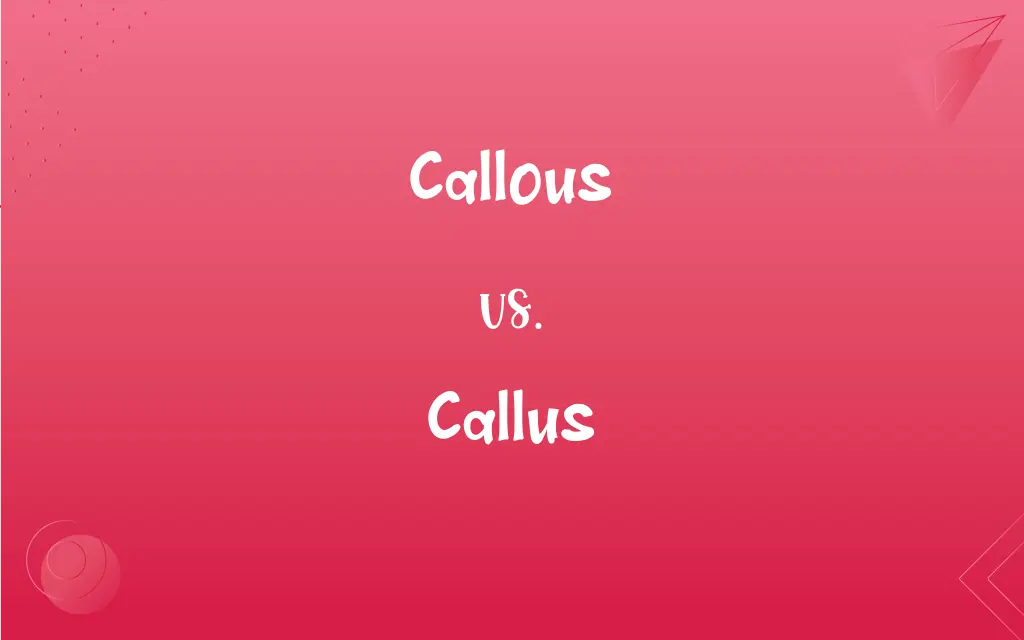Callous vs. Callus: What's the Difference?
Edited by Aimie Carlson || By Harlon Moss || Updated on October 27, 2023
Callous means emotionally hardened or unfeeling. Callus means thickened skin area due to friction or pressure.

Key Differences
"Callous" is an adjective that describes a lack of sympathy or sensitivity towards others, indicating a certain emotional hardness. Someone might be described as having a "callous attitude" if they show indifference to the sufferings or feelings of others. In contrast, "callus" is a noun referring to the toughened area of skin that has become thick and hard as a result of friction, pressure, or exposure. While "callous" reflects an emotional state, "callus" pertains to a physical condition, primarily related to the skin.
In literature, a character might be depicted as "callous" if they exhibit cold or uncaring behavior, painting a picture of emotional distance or cruelty. Such portrayals contribute to the depth and complexity of a narrative, adding layers to character development. Meanwhile, a "callus" might be used to symbolize a life of hard work, manual labor, or consistent effort, as these hardened areas often develop on hands or feet due to repetitive actions. Both "callous" and "callus", though different in meaning, can be used to provide insights into a character's background or nature.
From a medical perspective, "callus" represents a protective response of the body. When our skin faces constant friction or pressure, it forms a "callus" to shield the underlying tissues. This is a natural and adaptive response. On the other hand, being "callous" isn't typically discussed in medical contexts, as it pertains to emotional disposition rather than physical well-being. However, if a healthcare professional were described as "callous", it would indicate a lack of bedside manner or empathy towards patients.
In everyday conversations, telling someone they're being "callous" would be pointing out their insensitivity or lack of compassion in a particular situation. It's a word that carries emotional weight and could be perceived as a reprimand. On the flip side, mentioning a "callus" might lead to discussions about physical activities like playing the guitar or lifting weights, both actions that can lead to the formation of calluses on one's fingers or palms. The divergence between "callous" and "callus" is clear when used in regular dialogue, with one addressing emotional demeanor and the other, a physical manifestation.
Culturally, being "callous" is often viewed negatively, symbolizing a deficiency in understanding or human warmth. Societies value empathy and compassion, making "callous" behavior undesirable. However, having a "callus" doesn't carry a similar cultural judgment. In some contexts, it might even be seen as a badge of honor, indicating hard work or dedication to a craft. While the emotional implications of "callous" can evoke strong reactions, "callus", being a neutral term, is typically met with curiosity or understanding.
ADVERTISEMENT
Comparison Chart
Meaning
Emotionally hardened or insensitive
Thickened skin due to friction
Usage
Figurative, describing attitudes
Literal, describing a physical state
Connotation
Often negative, related to lack of empathy
Neutral, related to skin protection
Physical Manifestation
None
Visible and tactile on the skin
Origin
Psychological or metaphorical
Physical, due to repeated pressure or friction
ADVERTISEMENT
Callous and Callus Definitions
Callous
Emotionally insensitive.
His callous remarks hurt her feelings.
Callus
Thickened skin from friction.
She developed a callus on her foot from hiking.
Callous
Lacking pity or compassion.
She criticized his callous indifference to poverty.
Callus
Protective skin thickening.
Calluses on his hands were evidence of hard work.
Callous
Showing a cruel disregard for others.
The thief's callous actions showed no remorse.
Callus
A hardened area of skin.
The guitarist had calluses on his fingers.
Callous
Hardened in feeling.
Years of war had made him callous.
Callus
Area of toughened skin.
He treated the callus with a special cream.
Callous
Unfeeling or unsympathetic.
His callous response to the tragedy was shocking.
Callus
Result of skin's response to pressure.
Her new shoes caused a callus to form.
Callous
Having calluses; toughened
Callous skin on the elbow.
Callus
A localized thickening and enlargement of the horny layer of the skin. Also called callosity.
FAQs
Is "callous" used in a physical context?
No, it's used to describe attitudes or emotions.
Does "callous" have a negative connotation?
Yes, it often implies a lack of empathy or sensitivity.
Can a person become less callous?
Yes, with empathy and awareness, one can become less callous.
Can "callus" refer to a personality trait?
No, it specifically refers to a physical skin condition.
Can "callous" describe an action?
Yes, actions can be described as callous if they're insensitive.
Can someone be callous in one situation but not another?
Yes, callousness can vary depending on the context.
What is a "callus"?
A callus is an area of thickened skin due to friction or pressure.
Is "callus" a noun or verb?
It's a noun referring to the thickened area of skin.
Is a "callus" harmful?
Usually not; it's often a protective response of the skin.
What does "callous" mean?
It means emotionally hardened or insensitive.
Is being "callous" always intentional?
Not necessarily; it can be unintentional or due to unawareness.
Are "calluses" always on feet?
No, they can form on any part of the skin exposed to friction.
Can "calluses" be prevented?
Yes, by reducing friction and wearing protective gear.
Are "calluses" always noticeable?
Not always; they can range from mild to very prominent.
Can you see a "callus"?
Yes, it's a visible thickening of the skin.
Is "callous" an adjective?
Yes, it's an adjective describing a lack of feeling or empathy.
Does "callous" have a positive use?
Rarely, as it usually describes negative traits.
How is a "callus" formed?
It forms due to repeated friction or pressure on the skin.
Do "calluses" require medical attention?
Usually not, unless they cause discomfort or pain.
Can someone be unintentionally callous?
Yes, sometimes people are callous without realizing it.
About Author
Written by
Harlon MossHarlon is a seasoned quality moderator and accomplished content writer for Difference Wiki. An alumnus of the prestigious University of California, he earned his degree in Computer Science. Leveraging his academic background, Harlon brings a meticulous and informed perspective to his work, ensuring content accuracy and excellence.
Edited by
Aimie CarlsonAimie Carlson, holding a master's degree in English literature, is a fervent English language enthusiast. She lends her writing talents to Difference Wiki, a prominent website that specializes in comparisons, offering readers insightful analyses that both captivate and inform.































































